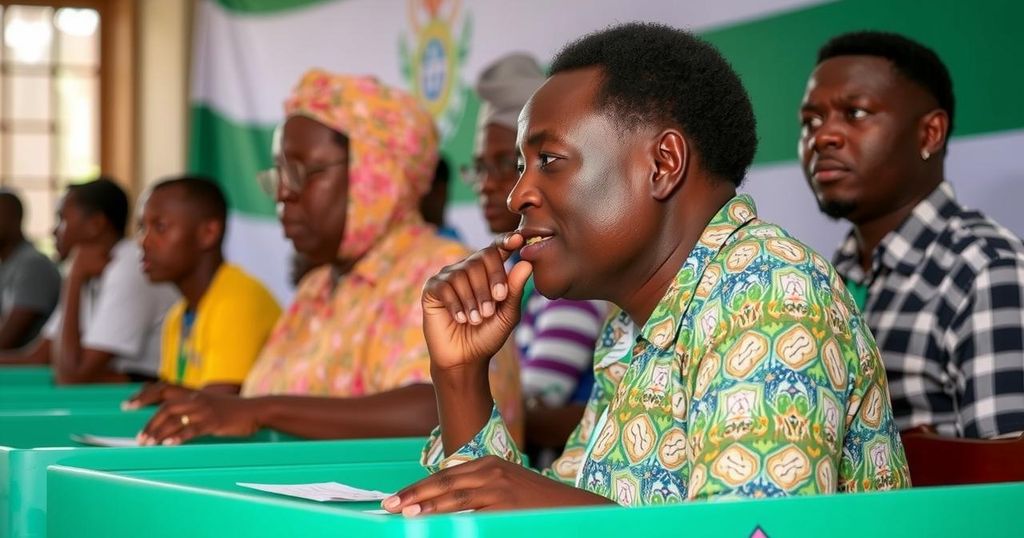Gabon Referendum Shows Major Support for New Constitution

Gabon’s military rulers claim overwhelming support for a new constitution via a recent referendum, with provisional results indicating 91.8% approval from voters. The proposed changes aim to limit presidential terms, abolish the prime minister role, and prevent dynastic succession. While voter turnout was 53.54%, concerns about authoritarianism persist, particularly regarding the junta’s influence on the electoral process and public sentiment towards governance.
Gabon’s military authorities have announced significant support for a new constitution following a recent referendum, suggesting a transformative period for the resource-rich nation. Provisional results indicate that 91.8 percent of the approximately 860,000 registered voters supported the constitutional changes, as per the Committee for the Transition and Restoration of Institutions (CTRI). Voters were urged through various media platforms to participate, either endorsing the new constitution with a green ballot for “yes” or a red one for “no”.
The proposed constitution introduces several pivotal reforms, establishing a two-term limit of seven years for the presidency, abolishing the role of the prime minister, and prohibiting dynastic rule. It further mandates that presidential candidates must be Gabonese citizens with at least one Gabonese parent and a Gabonese spouse. This stipulation rules out former president Ali Bongo Ondimba, whose marriage to a French national disqualifies him from future elections.
Amidst a backdrop of heavy governmental influence favoring a “yes” vote, voter turnout was reported to be 53.54 percent, a figure that some local media outlets deemed disappointing compared to earlier projections. Voting proceeded without significant disruptions across 2,835 polling stations, although security remained tight due to a military presence.
Transitional president Brice Oligui Nguema characterized the referendum as a “great step forward” for democracy while expressing aspirations to restore civilian governance after a two-year transitional period. Notwithstanding these declarations, concerns persist regarding the constitution’s potential to entrench authoritarian rule, with critics alleging that the military is fostering a dictatorship.
Polling station queues symbolized the public’s engagement, though many voters like civil servant Nathalie Badzoko confessed they had not fully grasped the constitutional text. Lawyer Marlene Fabienne Essola Efountame criticized the proposed constitution as self-serving for the current leadership, emphasizing fears that it could consolidate power within a single leader.
The Ministry of Interior highlighted its efforts to ensure a transparent referendum, inviting international observers, though they were absent from earlier elections. As discussions regarding national issues unfold, polls indicate a prevalent optimism about the nation’s trajectory, accompanied by ongoing concerns about employment, healthcare, and rising living costs, underscoring the need for robust governance in the years ahead.
The recent referendum in Gabon follows a military coup that took place in August 2022, which ousted President Ali Bongo Ondimba after claims of electoral fraud during his presidency. The proposed new constitution is seen as a critical step in redefining the governance structure of Gabon and addressing long-standing grievances about corruption and leadership. This context highlights the significance of public engagement in the referendum and the potential ramifications for Gabon’s political landscape. Furthermore, the backdrop of unemployment and a rising cost of living has influenced public sentiment towards the transitional government led by Oligui.
In summary, Gabon’s referendum results reveal a clear mandate for a new constitution, suggesting a strong inclination towards political reform. However, the nature of these reforms raises important questions regarding the potential for sustained democracy versus authoritarianism. The ruling junta’s heavy promotion of a “yes” vote alongside ongoing public concerns about daily living conditions and job security illustrates the complexities within Gabon’s political transition. Monitoring developments as the final results are confirmed will be vital in assessing the future trajectory of governance in Gabon.
Original Source: www.tiogapublishing.com







